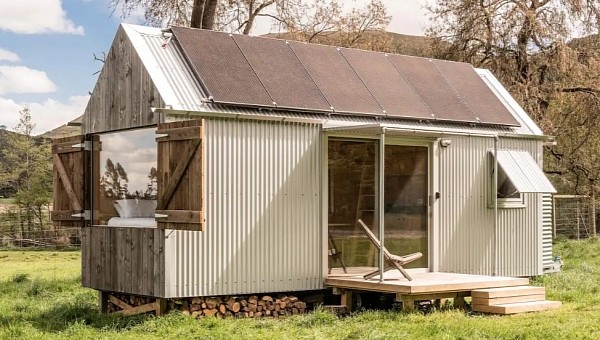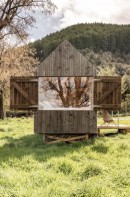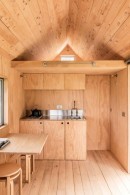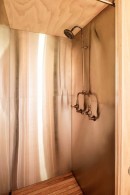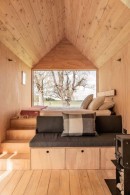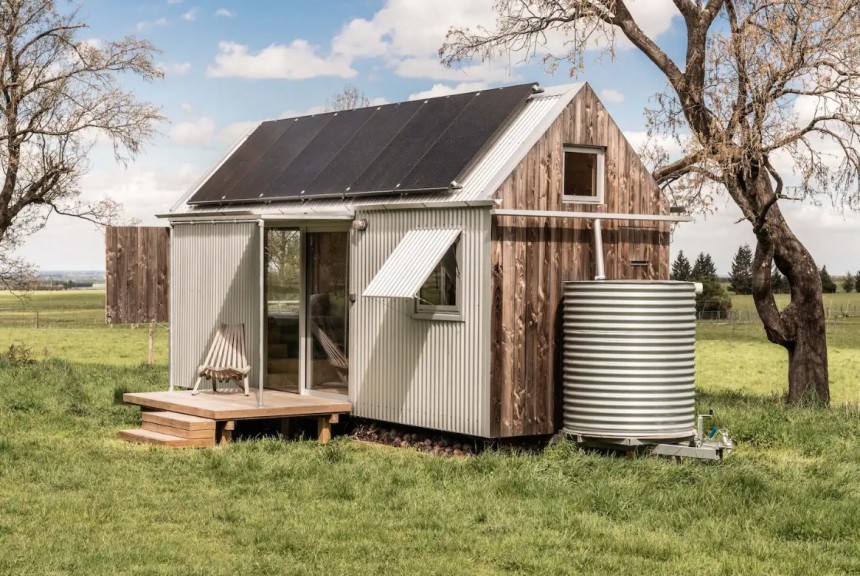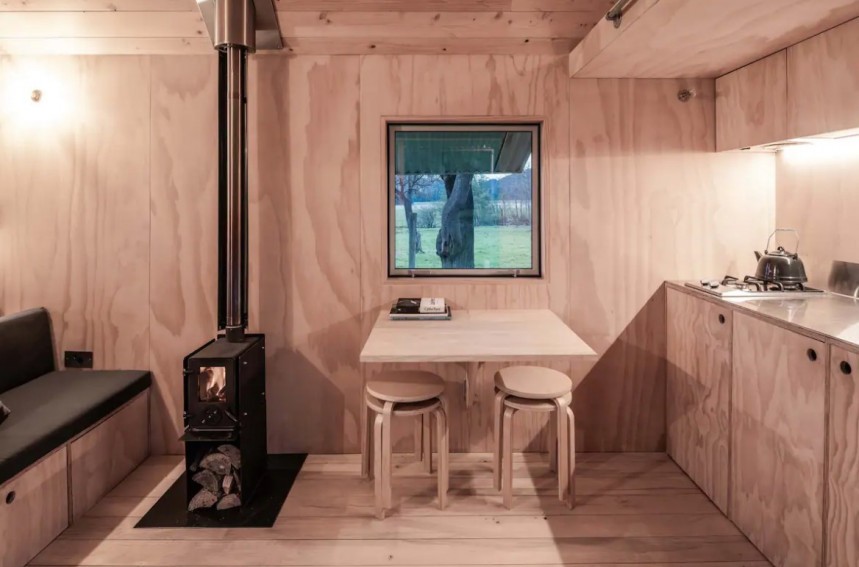A bigger home doesn’t equal a happier life, but don’t take our word for it. There are countless examples of this, as long as you’re willing to give them a few moments of your time.
Studio Well Architecture aims to prove that less is more with their smallest build, the Kereru Retreat, a micro-cabin that is completely off-grid, strikingly minimalist, and very beautiful. Completed in 2020, this impressive tiny home has been racking up design and architecture awards in its home country of New Zealand ever since, with the more recent being the top recognition at the Architectural Designers New Zealand Design Awards 2022.
Perhaps more to the point, it also offers a one-on-one experience to those looking to see for themselves where the merits of downsizing lie.
Kereru Retreat is essentially a tiny home, in that it sits on a trailer so it can be relocated at will, leaving no trace behind, since it doesn’t require a foundation. Being a tiny home also means it has all the advantages of one, besides a compact footprint and the promise of freedom of movement. It comes with reduced living costs, allows for intentional living, and is designed with an eye for sustainability.
The Kereru Retreat is also completely off-grid, which is another plus for those looking to minimize their carbon footprint. Downsizing does have the advantage of enabling a more affordable lifestyle, but when it started out in the early 2000s, its main goal was sustainability. If the years in between then and now were a race to peak sustainability, the Kereru Retreat is the winner.
Right now, this micro-cabin is located on Mount Hutt on the South Island of New Zealand, nestled among ancient trees and surrounded by the most picturesque scenery. It sits on privately-owned farmland, close to hiking and biking trails, and a short driving distance from Methven and Christchurch. Chances are it won’t be relocating anywhere else soon, since it’s being offered as a rental unit for weekend adventurers, couples looking for a romantic retreat, and people who might be interested in transitioning to tiny house living but are yet undecided about making the step.
A few nights’ stay at this retreat would be just the thing to give them a taste of the experience, bearing in mind that it would be a very minimalist, bare-bones one. Kereru Retreat offers only basic functionality with a very striking aesthetic, which means, in plainer terms, that it’s not for everyone. But for those who believe that “less is more,” it might just be the closest thing to perfection.
Offering 17.3 square meters (186 square feet) of living space, the tiny presents itself as a very rustic cabin from the outside, thanks to its wood and galvanized iron exterior, with barn-style opening shutters for privacy. Inside, you get a small living room that integrates the dinette and the kitchen, an elevated sleeping area, and another small loft that could, at least in theory, hold another bed for one guest, but which is now left empty.
The interior is done in salvaged untreated timber, which gives it a log cabin feel and makes up for the constricted layout. Finishing touches like the handcrafted faucets with exposed pipes in the bathroom and kitchen add an extra rugged vibe to the place, but without taking it into industrial style territory. The bathroom is the best example of this interesting mix of utilitarian and cozy, particularly the shower area, which features a steel enclosure with timber slats for the floor.
If one is to condense the entire philosophy of downsizing, one would probably get something very much like the Kereru Retreat. The kitchen offers basic functionality, with a two-burner gas stove, a hidden mini fridge, a kettle for the morning brew, and some overhead storage. It’s not the kind of kitchen you could cook large meals in, but it’s enough for self-catering when you’re on vacation. The dining nook to the side is comprised of a fold-down table for two, and round seats.
The master bed sits on an elevated area accessed by means of a few steps, with a small, storage-integrating couch placed down below, facing the wood-burning stove. The only (and most important) highlight in the bedroom is the large picture window that makes up most of the exterior wall – just perfect for stargazing or lazy mornings watching the sunrise.
The Kereru Retreat is fully self-sufficient, thanks to solar panels on the roof, a rainwater collection system, a composting toilet, and the wood-burning stove. No mention is made of autonomy, but the owners note that guests must be mindful of their energy consumption while staying there; however, they do guarantee enough power for the kitchen appliances and water heater, and charging of personal devices like phones and laptops.
In keeping with the sustainable goal of the design, the Kereru Retreat comes with biodegradable amenities in the bathroom, a wool duvet and locally-crafted wood throw blanket.
If you’re not in the area to experience downsizing with the Kereru Retreat for yourself, the photos in the gallery will have to do. This is what the antithesis of “bigger is better” looks like.
Perhaps more to the point, it also offers a one-on-one experience to those looking to see for themselves where the merits of downsizing lie.
Kereru Retreat is essentially a tiny home, in that it sits on a trailer so it can be relocated at will, leaving no trace behind, since it doesn’t require a foundation. Being a tiny home also means it has all the advantages of one, besides a compact footprint and the promise of freedom of movement. It comes with reduced living costs, allows for intentional living, and is designed with an eye for sustainability.
Right now, this micro-cabin is located on Mount Hutt on the South Island of New Zealand, nestled among ancient trees and surrounded by the most picturesque scenery. It sits on privately-owned farmland, close to hiking and biking trails, and a short driving distance from Methven and Christchurch. Chances are it won’t be relocating anywhere else soon, since it’s being offered as a rental unit for weekend adventurers, couples looking for a romantic retreat, and people who might be interested in transitioning to tiny house living but are yet undecided about making the step.
A few nights’ stay at this retreat would be just the thing to give them a taste of the experience, bearing in mind that it would be a very minimalist, bare-bones one. Kereru Retreat offers only basic functionality with a very striking aesthetic, which means, in plainer terms, that it’s not for everyone. But for those who believe that “less is more,” it might just be the closest thing to perfection.
Offering 17.3 square meters (186 square feet) of living space, the tiny presents itself as a very rustic cabin from the outside, thanks to its wood and galvanized iron exterior, with barn-style opening shutters for privacy. Inside, you get a small living room that integrates the dinette and the kitchen, an elevated sleeping area, and another small loft that could, at least in theory, hold another bed for one guest, but which is now left empty.
If one is to condense the entire philosophy of downsizing, one would probably get something very much like the Kereru Retreat. The kitchen offers basic functionality, with a two-burner gas stove, a hidden mini fridge, a kettle for the morning brew, and some overhead storage. It’s not the kind of kitchen you could cook large meals in, but it’s enough for self-catering when you’re on vacation. The dining nook to the side is comprised of a fold-down table for two, and round seats.
The master bed sits on an elevated area accessed by means of a few steps, with a small, storage-integrating couch placed down below, facing the wood-burning stove. The only (and most important) highlight in the bedroom is the large picture window that makes up most of the exterior wall – just perfect for stargazing or lazy mornings watching the sunrise.
In keeping with the sustainable goal of the design, the Kereru Retreat comes with biodegradable amenities in the bathroom, a wool duvet and locally-crafted wood throw blanket.
If you’re not in the area to experience downsizing with the Kereru Retreat for yourself, the photos in the gallery will have to do. This is what the antithesis of “bigger is better” looks like.
